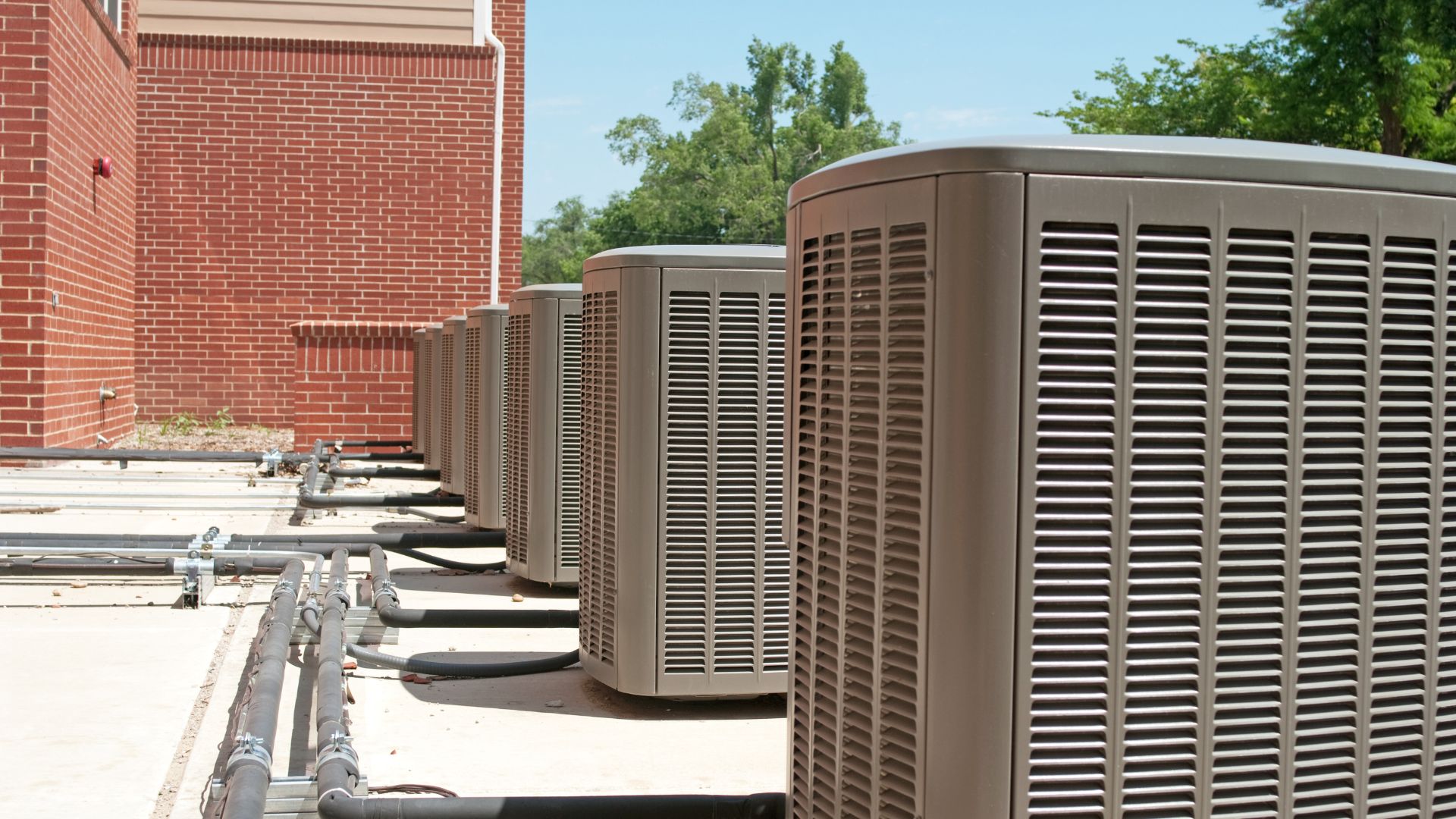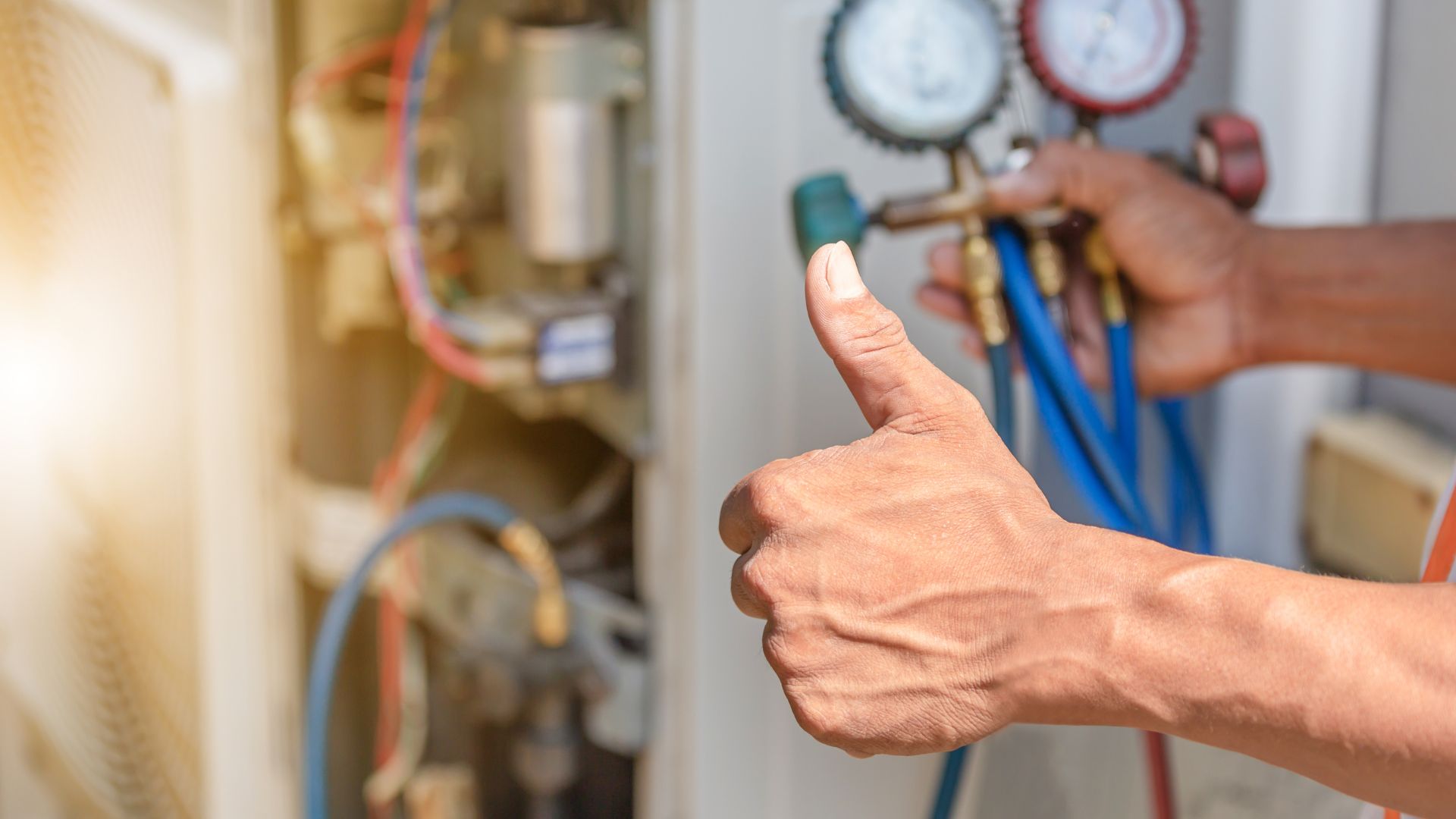To excel in HVAC, you need both technical know-how and practical skills. This guide outlines the crucial proficiencies, like system understanding and problem-solving, that every aspiring HVAC technician must master. Read on to learn what skills do you need to excel in HVAC and thrive in this challenging field.
Key Takeaways
- HVAC technicians must possess comprehensive knowledge of various HVAC systems, including their components and operations, to effectively perform installations, maintenance, and repairs.
- Technical expertise, problem-solving abilities, and effective communication are crucial skills for HVAC technicians to diagnose issues, manage client interactions, and enhance service quality.
- Understanding safety protocols and building codes and utilizing HVAC software are essential for ensuring compliance, improving efficiency, and fostering customer satisfaction in the HVAC industry.
Comprehensive Knowledge of HVAC Systems
Possessing an extensive knowledge base about HVAC systems is fundamental to the success of a technician pursuing an HVAC career. It’s essential for them to have an in-depth understanding of how these systems operate, as this expertise is crucial when diagnosing and rectifying issues. This comprehensive insight allows technicians to identify problems quickly and ensure that the systems continue running effectively.
It’s imperative for HVAC technicians to be acquainted with various kinds of HVAC configurations, such as split units, ductless options, and centralized air conditioning networks. Their familiarity should include not only the different types but also their individual components and how they function together within the system. Employers typically prefer candidates who are adept at articulating these component functions convincingly due to their solid comprehension of them.
Armed with a robust grasp of the intricacies of HVAC mechanics, an HVAC technician can confidently carry out installations along with routine maintenance tasks or repairs needed on hvac systems ensuring operational excellence and reliability.
Technical Expertise in HVAC Equipment
HVAC technicians must possess a robust technical expertise to execute their duties with precision. They need to be skilled in using various technologies, including HVAC software, multimeters and an array of both manual and electric tools. Such proficiency is crucial for precise troubleshooting and effective repair that ensures peak performance of HVAC systems.
It’s important for HVAC techs to keep pace with the latest technological advancements within the industry as they provide them an edge over competitors. Familiarity with digital controls and diagnostic features found in contemporary HVAC systems is imperative. Ongoing improvement of hvac skills enables these professionals to fulfill customer requirements effectively while upholding superior standards of service.
Problem-Solving Abilities
HVAC technicians rely on their adept problem-solving skills to quickly pinpoint and rectify problems. Possessing robust diagnostic abilities is crucial, enabling these professionals to accurately detect issues and formulate effective strategies for resolution. Critical and creative thinking is indispensable to navigate complex challenges that require unique approaches.
Collaborating as a team plays a pivotal role in the efficient management of difficulties, ensuring challenges are addressed swiftly and do not worsen over time. When this cooperative effort is coupled with an acute focus on detail, it guarantees swift and successful solutions to problems encountered.
Mechanical Aptitude
HVAC technicians must possess a robust mechanical aptitude as it is critical to understand the workings of components such as compressors and fans. This understanding facilitates the efficient operation of HVAC systems by enabling professionals to diagnose and repair complex equipment.
It’s imperative that these technicians demonstrate their mechanical prowess through hands-on experience. Proficiency in using various tools and executing detailed tasks, including making electrical connections, requires fine motor skills and coordination. Mastery in this area ensures top-quality repair work and installations, which are pivotal for achieving excellence in service delivery.
Electrical Systems Knowledge
It is imperative for HVAC technicians to possess a comprehensive knowledge of various electrical components, including wiring, circuit boards, and voltage requirements, as well as the ability to decipher electrical schematics.
Such proficiency in electricity-related matters is crucial for the proper and efficient functioning of HVAC systems.
HVAC technicians must be adept at reading and interpreting wiring diagrams and schematics. This skill is essential when it comes to diagnosing problems with systems or conducting troubleshooting procedures. Awareness of voltage specifications alongside adherence to safety protocols is also fundamental in preventing dangerous situations during HVAC work.
The thorough expertise in these areas equips HVAC technicians with the necessary skills to diligently maintain and repair systems, ensuring reliability and precision in their service.
Effective Communication Skills
It is imperative for HVAC technicians to articulate technical aspects in an understandable manner when engaging with customers. By employing active listening, these professionals can swiftly comprehend the needs of their clients and develop appropriate solutions. Steering clear of complex terminology helps solidify trust and confidence as it aids customers’ comprehension of the work planned.
Keeping the customer informed during each stage of a project demonstrates a respect for their schedule and contributes positively to their satisfaction levels. Upholding professionalism while also issuing apology, accepting responsibility, and providing comfort are vital approaches when addressing grievances from dissatisfied clientele.
Ensuring clarity in communication lies at the heart of delivering service that meets high standards while fulfilling customer expectations for gratification.
Time Management Skills
HVAC technicians can maximize their day by adeptly balancing standard upkeep and critical repair work through proficient time management. By efficiently prioritizing tasks and arranging schedules, they are capable of addressing numerous service calls within a single day, which significantly boosts customer satisfaction.
Possessing solid organizational abilities is key for HVAC technicians to effectively monitor their equipment, components, and documentation, streamlining task execution. Assigning responsibilities wisely among team members also plays an essential role in managing the workload seamlessly while minimizing errors. Sharpening soft skills alongside prioritization furthers overall efficiency.
Skillful time management equips HVAC technicians with the capacity to uphold exemplary standards in craftsmanship while swiftly satisfying client requirements.
Physical Stamina and Strength
HVAC work requires robust physical health and stamina due to the need to carry heavy parts and navigate through tight spaces such as attics or crawlspaces. Effective performance during busy times often involves extended working hours, highlighting the importance of maintaining excellent physical condition.
To safely manage the demands of their job, HVAC technicians must possess critical skills like enduring strength, balance, and coordination. These are fundamental for dealing with the strenuous aspects associated with this line of work.
Safety Awareness and Protocols
Adherence to safety awareness and protocol observance is paramount in the HVAC industry. To guarantee secure operations and avert mishaps, it’s essential that technicians conform to the guidelines set by OSHA and EPA. They need expertise in safely managing potentially hazardous substances such as refrigerants and cleaning agents.
The employment of appropriate personal protective equipment (PPE) plays an indispensable role in shielding oneself from harm and minimizing occupational injuries on the job site. Effective teamwork coupled with clear communication serves as a cornerstone for ensuring safety, facilitating both the recognition of hazards and their subsequent reduction. Keeping abreast of updates in safety measures is crucial for upholding a safe work environment consistently.
Attention to Detail
HVAC technicians must prioritize attention to detail, especially when pinpointing problems and setting up systems. By strictly following procedures, validating their work meticulously, and conducting comprehensive assessments, they can avert small complications from becoming major ones. This dedication ensures the delivery of high-quality service that bolsters customer satisfaction.
When an HVAC technician accentuates their focus on detail within their resume, it reflects a deep-seated commitment to excellence and accuracy. Highlighting this characteristic underscores the provision of dependable services, which in turn nurtures ongoing patronage and favorable word-of-mouth recommendations.
Adaptability and Continuous Learning
HVAC technicians benefit from being adaptable, as it equips them to deal with unforeseen challenges and various situations they encounter in their work. Staying abreast of new HVAC technologies and innovations is crucial, and this can be achieved through continual learning.
By engaging in regular training sessions and networking opportunities, these professionals enhance both their knowledge base and skill set. This dedication to ongoing education allows them to remain at the forefront of their industry while guaranteeing that they provide high-quality service by adapting seamlessly to technological advancements.
Customer Service Excellence
For HVAC companies, providing top-notch customer service is crucial in gaining new customers and keeping existing ones. When clients have favorable encounters, they are more likely to request services again and recommend the business to others, a benefit that can surpass the results of conventional advertising strategies. By imparting knowledge on proper maintenance techniques, technicians empower homeowners to cut costs and avoid breakdowns.
Effective communication paired with genuine empathy fosters trust between the company and its clientele, which plays a pivotal role in achieving customer satisfaction. High-quality customer care encompasses attentiveness throughout the entire interaction with clients—previous to their appointment, whilst service is being carried out, as well as following up afterward—demonstrating an unwavering dedication to precision and exceptional attention to their needs.
Teamwork and Collaboration
Working cooperatively enhances efficiency and guarantees the successful completion of projects. For HVAC technicians to function effectively as a team, transparent communication, dependability, and common objectives are crucial components. By assisting one another and combining their efforts, they can adeptly address difficulties and deliver service of superior quality.
The use of HVAC software significantly fosters teamwork by allowing for instantaneous updates between onsite technicians and administrative personnel back at the office. This seamless coordination ensures that all team members have updated information at all times, thereby improving both productivity and performance.
Utilizing HVAC Software
The significance of HVAC software in the sector is growing. Utilizing scheduling platforms such as SAWIN can boost productivity by improving task distribution and increasing transparency of job-related tasks. Numerous businesses are adopting systems like SAWIN Field Service Management to bolster efficiency and optimize their workflows.
Such HVAC software simplifies job organization, automates the processes for scheduling and dispatch, and assists with tracking invoices as well as payments. Applications like ServiceTitan Mobile empower field technicians to offer comprehensive information and quotations on-site, thus elevating service quality while enhancing time management practices.
Implementing HVAC software plays a pivotal role in amplifying technician prowess and performance, which translates into superior rates of job attainment along with heightened levels of customer satisfaction.
Understanding Building Codes
HVAC professionals can prevent project holdups and assure adherence to regulations by being well-versed in local and state building codes. Legal protection for contractors is secured through compliance, which also guarantees positive outcomes during inspections. HVAC systems that meet these standards tend to enhance both the property’s market value and its attractiveness to potential purchasers.
Compliance with relevant codes is vital for guaranteeing the safe and reliable performance of installations. It mitigates risks and assures effective functioning of the system. By mastering these building requirements, technicians maintain exemplary service levels while circumventing any legal complications associated with non-compliance.
Summary
In summary, to succeed in the HVAC field and deliver high-quality service that guarantees customer satisfaction, technicians must develop a varied skill set. This includes having strong technical expertise, adept problem-solving capabilities, proficient communication abilities, and exceptional prowess in customer relations. For those intent on advancing their careers as HVAC professionals and augmenting their skills palette, participation in continuing education programs can be invaluable. For instance, HVAC continuing education in Texas courses keep them abreast of evolving industry standards and technological developments. At State Approved, we provide an array of continuing education options tailored for the growth of HVAC experts. Peruse our curriculum now to progress in your role within this dynamic sector.
Frequently Asked Questions
What skills are essential for an HVAC technician?
An HVAC technician must possess a strong knowledge of HVAC systems, technical expertise, problem-solving skills, mechanical and electrical system understanding, as well as effective communication abilities.
These skills are vital for ensuring optimal performance and customer satisfaction in the field.
Why is technical expertise important in the HVAC industry?
In the HVAC industry, possessing technical expertise is essential for technicians to properly identify and fix systems, guaranteeing peak performance and delivering efficient service to customers.
How does attention to detail benefit HVAC technicians?
Attention to detail allows HVAC technicians to identify and resolve minor issues before they develop into significant problems, enhancing service quality and boosting customer satisfaction.
What role does customer service play in the HVAC industry?
Customer service is vital in the HVAC industry as it helps attract and retain clients, ultimately boosting demand and generating positive referrals. A strong customer service approach fosters long-term relationships and enhances business reputation.
Why is continuous learning important for HVAC technicians?
HVAC technicians must engage in ongoing education to stay abreast of new technologies and trends within the industry, ensuring they can offer high-quality service and maintain a competitive edge.




